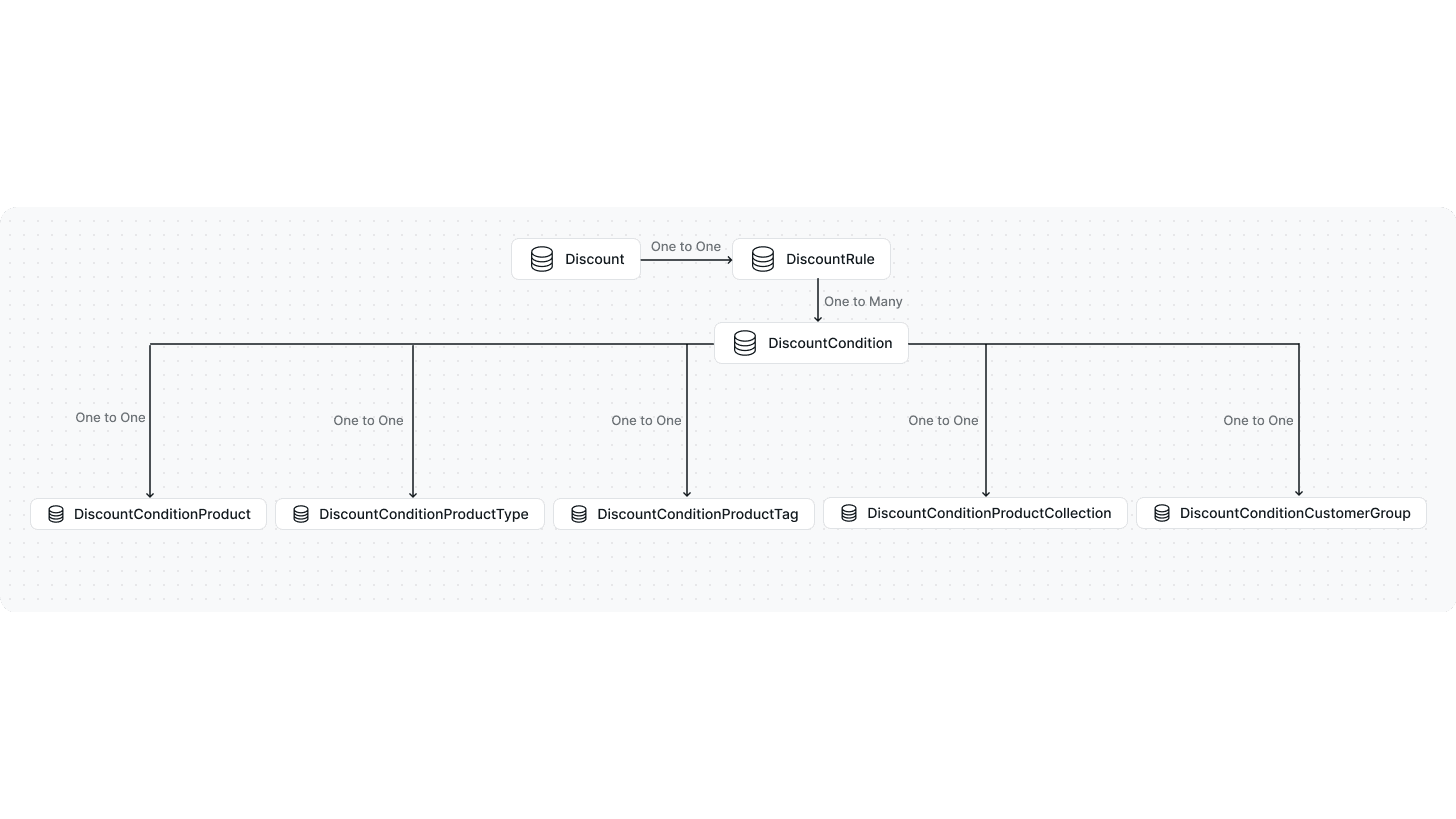Discounts Architecture
In this document, you’ll learn about Discounts architecture and how it works.
What are Discounts
Discounts allow you to offer promotions to your users generally for marketing purposes. Customers can apply a discount code to their checkout flow to use the discount if it’s valid for them.
Discounts can be limited by a set of configurations and conditions. For example, you can indicate how many times a discount can be used or by which customer group. You can also specify which products this discount can be used with, among other conditions.
Discount Types
There are three types of discounts:
- Percentage discount: remove a percentage of the price every product in the cart that the discount can be applied to.
- Fixed discount: remove a fixed amount either of the customer’s total checkout amount or of the price every product in the cart that the discount can be applied to.
- Free shipping discount: remove any shipping amount from the customer’s order during checkout.
Example Use Cases
Discounts can be used in many use cases including:
- Applying discounted amounts for wholesale or B2B customers.
- Creating a sale within a specific period of time (for example, a summer sale).
- Give your customers free shipping for a limited time.
Discount Entity Overview
A discount is represented by the Discount entity. Some of its important attributes are:
codeis a unique code that you specify when you create the discount. Customers use this code to apply the discount during checkout. The code can only include upper-case letters and numbers.rule_idis the ID of the rule of this discount. Theruleattribute is the expanded object of theDiscountRuleentity. You can use theruleattribute to get details regarding the discount type. You can learn more about this in theDiscountRuleentity overview later.is_disabledis a boolean value that indicates whether this discount is published or not.regionsare the regions this discount can be used in.starts_atandends_atare timestamps that indicate when the discount starts and ends. If no expiry date is set for the discount,ends_atwill benull.usage_limitis the number of times the discount can be used. If there is no limit the value will benull.usage_countis the number of times the discount has been used.
Dynamic Discounts
Dynamic discounts are a set of discount conditions and configurations that you can reuse across many discounts.
After creating a dynamic discount, you can use it to create “child” discounts. Child discounts have the same conditions and configurations as the “parent” dynamic discount but with a different discount code.
The is_dynamic attribute in the Discount entity is a boolean value that determines whether the discount is dynamic or not. Child discounts are related to the parent discount using the parent_discount_id attribute which is a foreign key to the same Discount entity.
DiscountRule Entity Overview
Every Discount entity belongs to a DiscountRule entity. DiscountRule includes details such as the type of discount, the amount to be discounted, and more.
Some of the DiscountRule entity’s important attributes are:
typeis an enum string indicating the type of the discount. It must be eitherfixed,percentage, orfree_shipping.valueis the value to be discounted. The value of this depends on the value oftype:- If
typeisfixed,valuewill be the amount to be removed either from the total or from each product this discount is applied to. - If
typeispercentage,valuewill be the percentage to be removed from each product this discount is applied to. - If
typeisfree_shipping,valuewill be 0.
- If
conditionsis an array of all discount conditions, if there are any.
DiscountCondition Entity Overview
A discount can optionally have discount conditions. Discount conditions are used to further add limitations on when the discount can be applied.
A DiscountCondition belongs to a DiscountRule entity. The discount_rule_id attribute indicates the ID of the DiscountRule it belongs to.
Discount conditions have an attribute type that indicates the condition’s type. Its value must be one of the following:
productsmeans the condition applies to products.product_typesmeans the condition applies to product types.product_collectionsmeans the condition applies to product collections.product_tagsmeans the condition applies to product tags.customer_groupsmeans the condition applies to customer groups.
Each condition type can be used for one condition in a discount. For example, you can add only one product discount condition to a discount.
Discount conditions also have an attribute operator that indicates how the condition should be applied. It must have one of the following values:
inmeans the discount can be applied only for the items specified in the condition. For example, if thetypeisproductand theoperatorisin, it means this condition defines which products must be available in the customer’s cart for the discount to apply.not_inmeans the discount can be applied for all items except those specified in the condition. For example, if thetypeisproductand theoperatorisnot_in, it means that the discount can be applied to any item in the cart that's not specified in the condition.
Condition Type Relations
Based on the value of type, one of the following relations can be used to retrieve the condition’s items:
productsis an array of products that this condition applies to if the condition’stypeisproducts. Each item of the array would be aDiscountConditionProduct.product_typesis an array of product types that this condition applies to if the condition’stypeisproduct_types. Each item of the array would be aDiscountConditionProductType.product_collectionsis an array of product collections that this condition applies to if the condition’stypeisproduct_collections. Each item of the array would be aDiscountConditionProductCollection.product_tagsis an array of product tags that this condition applies to if the condition’stypeisproduct_tags. Each item of the array would be aDiscountConditionProductTag.customer_groupsis an array of customer groups that this condition applies to if the condition’stypeiscustomer_groups. Each item of the array would be aDiscountConditionCustomerGroup.
